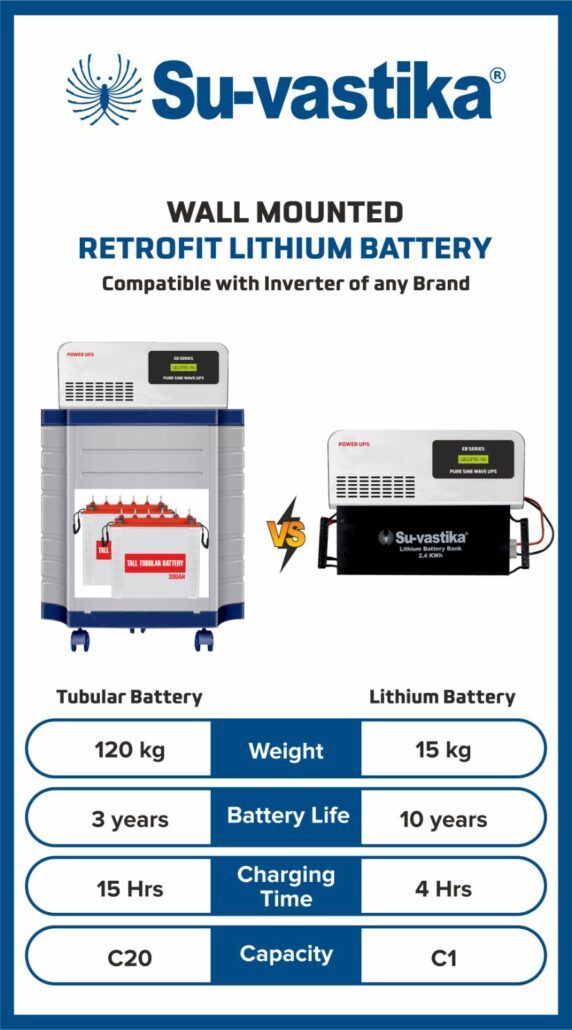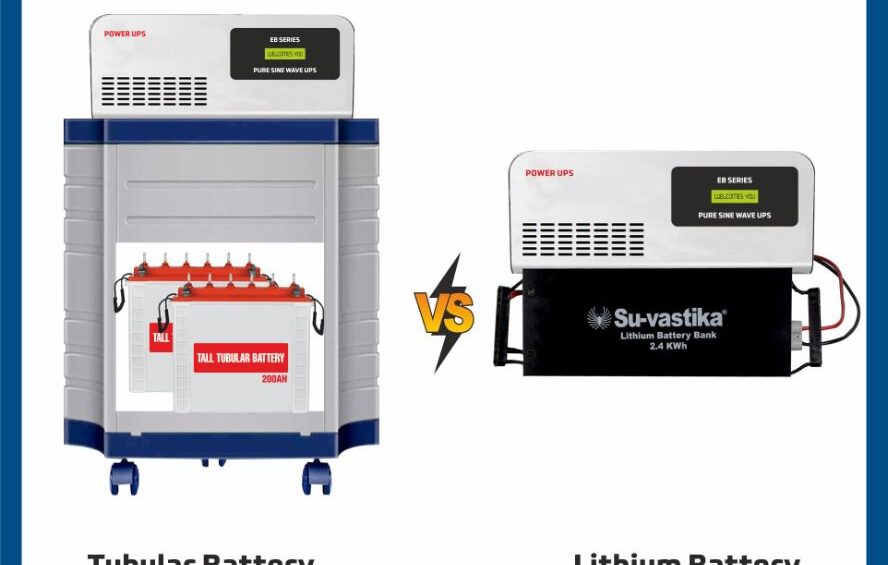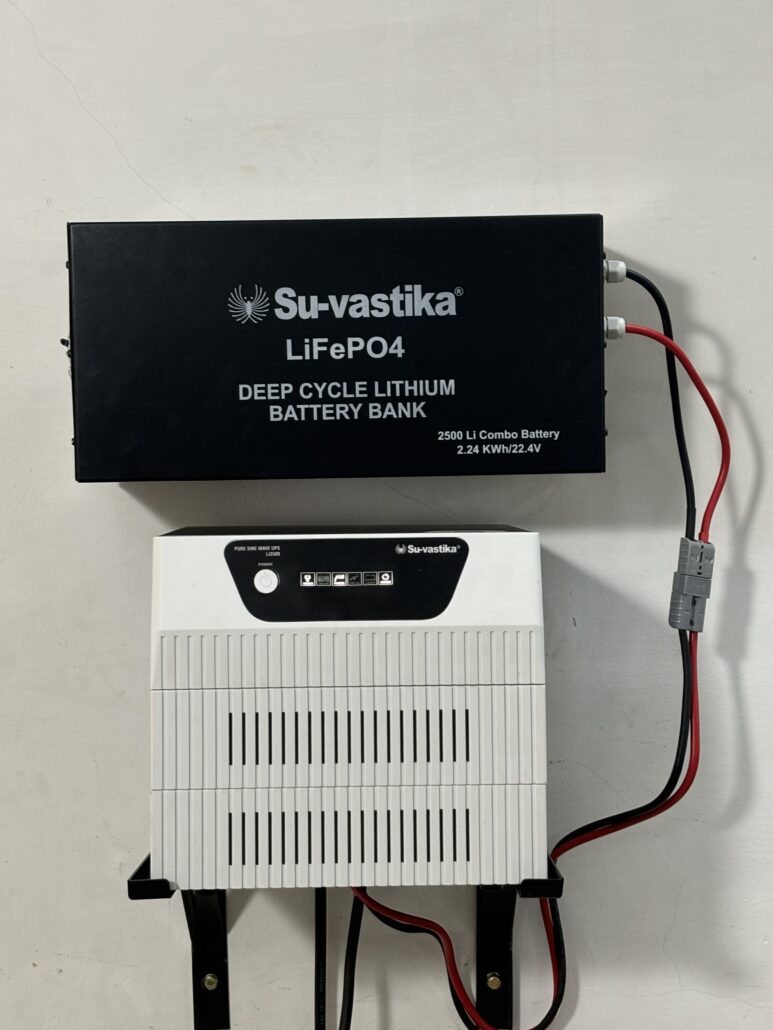
-
Advantages of Lithium-ion Batteries:
- Longer Lifespan: Lithium-ion batteries typically offer a significantly longer cycle life compared to lead-acid batteries (often 3-5 times more). Some can last up to 10 years.
- Faster Charging: They charge much faster than lead-acid batteries (3-4 hours vs. 8-10 hours).
- Consistent Backup: Lithium batteries provide a more consistent backup throughout their life, unlike lead-acid batteries where backup time tends to decrease with age.
- Maintenance-Free: Lithium-ion batteries generally require no maintenance (no need for water topping).
- Safer: They are sealed and do not have the risk of acid spills or emit toxic fumes under normal operation. However, it’s important to note that if a lithium-ion battery goes into thermal runaway (overheating), it can emit dangerous gases like hydrogen fluoride and carbon monoxide.
- Compact and Lightweight: Lithium-ion batteries are generally smaller and lighter than comparable lead-acid batteries.
- Intelligent Management: Many lithium inverters come with a built-in Battery Management System (BMS) for optimal performance and safety.
- Cost: Lithium-ion batteries and inverters tend to be more expensive upfront compared to lead-acid options. However, the longer lifespan and reduced maintenance can offset this cost in the long run.
- Compatibility: Ensure the inverter is specifically designed for lithium-ion batteries and has the correct charging profiles.
- Safety Features: Look for inverters with robust safety features and a good Battery Management System (BMS).
Available Brands and Potential Models (with general features):
Based on the search results, some prominent brands in India offering lithium-based inverters include:
-
Luminous:
- Li-ON 1250: This is a popular model with an in-built lithium-ion battery (12.8V, likely around 100Ah or 1280Wh capacity). It’s a pure sine wave inverter, offering safe operation with no acid spills or toxic fumes. Features an LCD display for monitoring performance (charging time, backup time, load status, etc.). It’s designed to be compact and suitable for home use, with faster charging and longer backup. Warranty is often around 5+3 years on both inverter and battery. It can typically handle a load of around 800W.
- Regalia 1530: This is a higher capacity (1500VA) pure sine wave inverter with an in-built 48V (1440Wh) lithium-ion battery. It’s wall-mountable and features a touchscreen display. It boasts 3x faster charging than lead-acid batteries.
- Su-vastika: Has the Lithium Inverters based on AI technology as this is the first company in India to focus on the Lithium Inverter/UPS with small and heavy-duty applications. The Battery management System and Lithium Inverter talk to each other for the extra protection and all their models have the mobile applications in Android and IOS for controlling and monitoring application.
-
Microtek: While the search results mention Microtek inverters, specific lithium-based models in the 12V/24V range aren’t detailed. They offer a range of pure sine wave inverters that might be compatible with lithium batteries, but it’s crucial to check the specifications for lithium compatibility. Their inverters often feature microcontroller-based designs and various protection features.
-
Livguard: Livguard is mentioned as a leading brand. Specific low-voltage lithium inverter models aren’t detailed in the search results, but they offer inverters that customers review positively for performance and battery backup when used with their batteries. Again, confirm lithium compatibility for specific inverter models.
-
Genus: Genus offers inverters suitable for home use and solar applications. While they are listed among top inverter battery brands, specific 12V/24V lithium inverter models and technical details aren’t prominent in the results.
-
Loom Solar: Loom Solar offers lithium batteries and likely compatible inverters, but specific 12V/24V models with technical comparisons aren’t detailed here.
-
MuscleGrid: This brand appears to specialize in lithium batteries for inverters, offering 24V options like a 120Ah (25.6V actual) lithium solar inverter battery. They emphasize long cycle life and heavy-duty commercial-grade batteries.
Technical Comparison (General Points):
Since specific models and detailed technical specifications for 12V/24V lithium inverters aren’t readily available for a direct comparison in the search results, here are some general technical aspects to consider when comparing:
- VA/Wattage Rating: This determines the maximum load the inverter can handle. Choose based on your power requirements.
- Battery Voltage and Capacity (Ah/Wh): For 12V or 24V systems, the battery capacity will dictate the backup time. Higher Ah or Wh means longer backup.
- Inverter Technology: Opt for pure sine wave inverters as they provide a cleaner power output, safer for sensitive electronics.
- Charging Efficiency: Look for inverters with high charging efficiency to minimize power loss during charging.
- Protection Features: Overload protection, short circuit protection, over-temperature protection, and low battery protection are crucial safety features.
- Battery Management System (BMS): If the inverter has an in-built lithium battery, a good BMS is essential for safety and performance.
- Warranty: Check the warranty period for both the inverter and the battery.
- Display: Some inverters have displays (LCD or LED) that show important parameters like battery level, load, charging status, and fault indicators.
- Recommendation:
Given the limited specific technical data in the search results for direct 12V/24V lithium inverter comparisons, it is highly recommended to:
- Identify your specific power requirements (load in watts) and desired backup time. This will help you determine the necessary VA/wattage rating and battery capacity (Ah/Wh) for your inverter.
- Contact the manufacturers directly or visit their official websites. They will have the most up-to-date information on their lithium inverter models, their technical specifications (including voltage, capacity, charging rates, protection features), and compatibility.
- Read detailed product specifications and customer reviews on e-commerce platforms or other reliable sources before making a purchase.
By focusing on your specific needs and directly researching the latest offerings from reputable brands like Luminous, Su-vastika Microtek, Livguard, and others, you can find the best lithium inverter in the small 12V and 24V range for your requirements in India. Remember to prioritize safety features and ensure compatibility between the inverter and the lithium battery.







